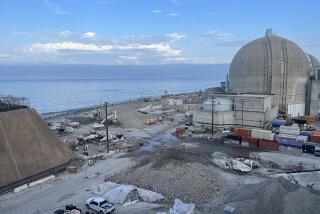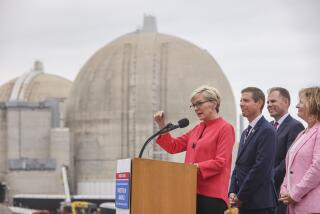U.S. Removing Nuclear Fuel From Former Soviet Republic
- Share via
WASHINGTON — Secretary of State Madeleine Albright said Tuesday that the U.S., aided by Britain, is removing a cache of highly enriched uranium and spent nuclear fuel from a research reactor in the former Soviet republic of Georgia to prevent the material from falling into the hands of terrorists or rogue states.
“We were concerned about some highly enriched uranium [that might] get into the wrong hands and wanted to make sure it was dealt with safely,” she told reporters. “So, in cooperation with other countries, we are taking the appropriate steps to ensure the safety of this material.”
Shukri Abramidze, head of applied research at the Georgian Academy of Science’s Institute of Physics in Tbilisi, confirmed that so much work has been done that the material has been almost totally removed, Reuters news service reported.
Navy Capt. Mike Doubleday, a Pentagon spokesman, said the U.S. Air Force is transporting about 8.8 pounds of highly enriched uranium and 1.75 pounds of radioactive spent fuel to a reprocessing facility in Scotland. “This effort is part of our continuing cooperation with states of the former Soviet Union to prevent the proliferation of weapons of mass destruction,” he said.
Georgian officials said that President Eduard A. Shevardnadze’s government supports the operation.
U.S. officials have been concerned for years that the material, stored at a Soviet-era research institute, might be obtained by Chechen separatists, the government of Iran or a terrorist group. Although the cache is too small by itself to produce a nuclear weapon, it is considered extremely dangerous.
Officials in Washington, Tbilisi and London confirmed the operation after it was reported Tuesday by the New York Times.
Britain agreed to reprocess the material into fuel for civilian power plants after the U.S. government balked at accepting the shipment. The Clinton administration was concerned about the reaction of environmental groups if the fuel were sent to the United States.
In London, a spokesman for Prime Minister Tony Blair said, “The government decision was taken on grounds of safety and nonproliferation.” But British officials declined on security grounds to say when the material would be taken to Dounreay on the remote north coast of Scotland.
The decision was attacked by Alex Salmond, the leader of the Scottish National Party, who told news agencies that Scotland was becoming a “soft touch for the dirty end of the nuclear industry.”
“It seems the prime minister is secretly offering Scotland as a nuclear waste bin without so much as a by your leave and certainly no public debate,” Salmond said.
Salmond’s pro-independence party is a close rival of Blair’s Labor Party in the first election, scheduled for May 1999, for Scotland’s new regional parliament.
More to Read
Sign up for Essential California
The most important California stories and recommendations in your inbox every morning.
You may occasionally receive promotional content from the Los Angeles Times.













